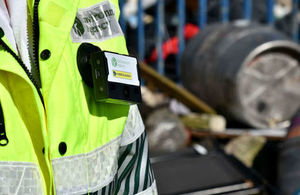A welcome announcement has come from the Ministry of Justice.
People in debt will be given greater protection from rogue bailiffs as the government on 22nd July 2019 announced the introduction of compulsory body-worn cameras. This will be helpful in all cases of complaint and wrongful enforcement.
See: https://www.gov.uk/government/news/body-worn-cameras-to-curb-aggressive-bailiffs
Missing footage
Obviously, it will not look good for enforcement agents if the relevant film is lost or proves of poor quality, in the event of a claim.
It is accepted in English law that a failure to produce a relevant document or piece of evidence in a civil case may be construed against a party.
There have already been cases reported where enforcement firms have settled claims where body camera footage has been found to be unavailable.
Rogues without cameras
Moreover it will contribute towards dealing with the problem of persons not regulated at all who pose as civil enforcement agents. These characters who lack proper credentials, ID and certainly won’t have a camera to film themselves.
They will also want to avoid wanting to be filmed by householders (increasing numbers of households have their own CCTV facilities and people can make their own films if they wish).
In all cases the best protection is that debt collectors and bailiffs cannot force entry to private homes for civil debts (save with criminal fines).
Use of films should be restricted
In cases where such footage is obtained and retained, care will also have to be taken with the use that images obtained are only used for legitimate regulatory purpose, and not for other commercial purposes
e.g. selling to television companies or used as casual entertainment amongst the industry or creditors.
Breach of privacy claims for wrongful filming
Such shows can give rise to successful claims for breach of privacy as shown in Ali & Anor v Channel 5 Broadcast Ltd [2018] EWHC 298 (Ch)). If footage obtained legitimately is misused , leaked or people are identified in public, a claim may arise.
In recent years there have been a growing number of broadcasts and television programmes intent on turning debt collection and enforcement law into entertainment, including footage filmed with the help of body cameras.
The High Court awarded damages to a couple who found their eviction featuring into an episode of Can’t Pay? We’ll Take It Away the inclusion of the Claimants’ private information on the television show was a breach of privacy and that the Defendant’s disclosure of what Arnold J found to be “fairly sensitive” private information to 9.65 million viewers, awarding each Claimant £10,000.
The Court of Appeal upheld these rulings in April 2019.
Essentially, as digital images, body camera obtained footage will be demandable under Data Protection provisions and the GDPR Directive will also apply to material from 18 May 2018.
In addition to Data Protection and GDPR, firms such as bailiffs collecting taxes or fines for government, the filming will also fall under the remit of the Office of Surveillance Commissioners (OSC) which oversees the conduct of covert surveillance and covert human intelligence sources by public authorities.
